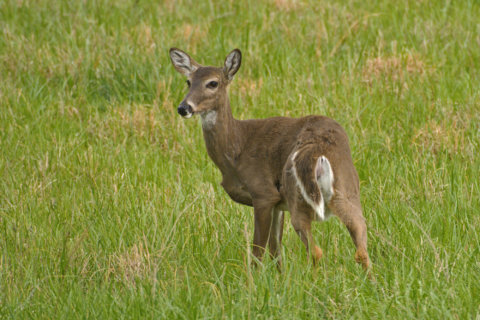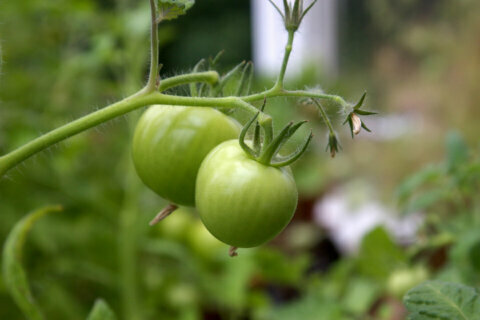Deer vs. hostas — the never-ending battle
Lavenia in Columbia, Maryland, writes: “What suggestions do you have to stop deer from eating my hosta plants?”
Repellents with the active ingredient “putrescent egg solids” have been shown to be highly effective, but you have to reapply them frequently in the kind of wet weather we’ve been having.
If the site is right, a motion-activated sprinkler can protect a fairly large area from pests such as deer, Canada geese, groundhogs and people by shooting cold water at the intruders.
You’ll find details on these deterrents and lots more Bambi-beating ideas in the series of Garden Plots we did on deer back in March.
Mint vs. oregano — no Thrilla in Manassas here
Doug in Adamstown, Maryland, writes: “What’s up with spearmint and oregano?! These guys just love to spread and are hard to get rid of. I’m finding suckers coming up several feet away from the main oregano patch, and I ‘removed’ all of the mint five years ago and put down plastic landscape fabric and pavers — and now sprigs of mint are coming back between the pavers! What would happen if I built a raised bed and planted mint in one corner and oregano in the other — which one would win?”
The mint, Doug — in the first round. Mint is relentlessly tenacious.
Luckily, it’s also a great “stepable” plant for use in between pavers. Just keep it mowed and enjoy the fragrance when you walk on it.
Plus, you can make mojitos. Lots of mojitos.
Grass clips vs. compost — not even a fight
Tom and Kathy — who now live in Seattle, but are formerly of D.C. — write: “We always enjoy your articles. You recently said that tomatoes should only be mulched with compost. But, what about grass clippings. Are they a suitable mulch for tomato plants?”
No — for three reasons:
- Grass clippings don’t provide the disease protection of compost, which tomatoes absolutely require in seasons that start out as wet as this one has in D.C., which is presumably normal weather in Seattle
- If the clippings are from a lawn that has been treated with herbicides, those clippings will be deadly to the tomato plants and any other plants that aren’t turf grass.
- Finally, those clippings are 10 percent nitrogen, the perfect food for lawns. You starve your turf a little bit every time you mow and then remove that perfect natural food.
Tomatoes and turf vs. wetness — don’t let wetness win!
As the D.C. area’s wetness woes continue, it’s time to reiterate our wet plant warnings:
- Try not to touch the leaves of any plants while those leaves are wet but especially the leaves of tomatoes, string beans and pole beans. These plants are especially prone to damage when they’re handled wet.
- You should never cut a lawn when it’s wet but Mother Nature has not been making that timing easy on us this spring, so do the best you can. Wait for at least a one day break in actual rain and then cut in the early evening, when morning dew won’t compound the problem. Cut as high as you possibly can to avoid injuring the bottom half the grass blades. Make sure you get that blade sharpened before you cut.
Mosquitoes vs. you — get BTI in your corner
“I got the wetness woes, I can’t dry my toes, and the mosquitoes are eating me alive!”
Yes, this wretched wet weather provides the perfect conditions for mosquito breeding. So as soon as I’m done saying this, get thee to a hardware store, home or garden center, and get some BTI.
Available in the form of little doughnuts, briquettes and granules, BTI is a naturally-occurring soil organism that prevents mosquito eggs and larva from successfully proceeding to adulthood.
Put out buckets of water laced with BTI, female mosquitoes will lay their eggs in the water but no adults will emerge. BTI only affects mosquitoes.
It’s harmless to people, pets, birds, butterflies, frogs, toads and all those other good things.
Mike McGrath was editor-in-chief of ORGANIC GARDENING magazine from 1990 through 1997. He has been the host of the nationally syndicated public radio show “You Bet Your Garden” since 1998 and Garden Editor for WTOP since 1999. Send him your garden or pest control questions at MikeMcG@PTD.net.







